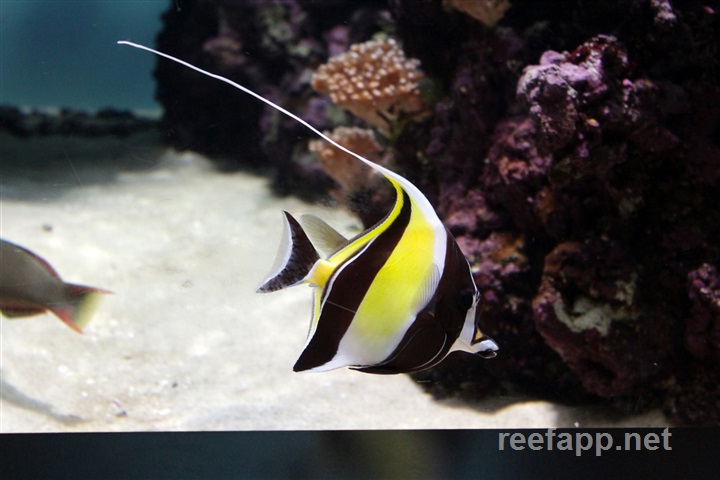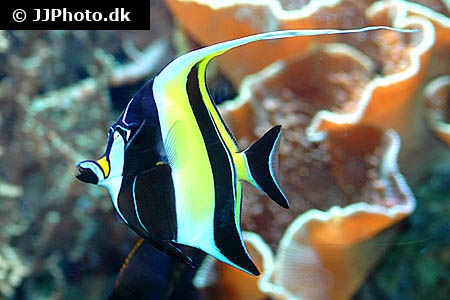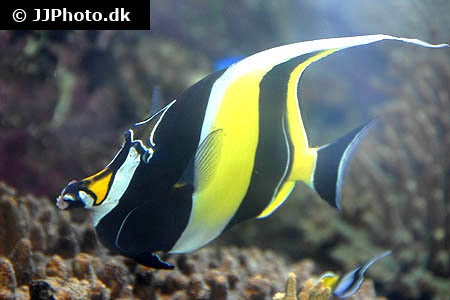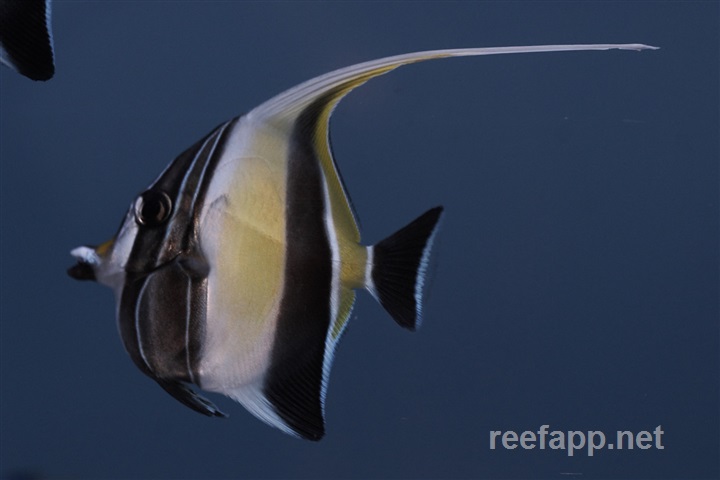Zanclus cornutus




| Latin name | Zanclus cornutus |
|---|---|
| Local name | Moorish Idol |
| Family | Zanclidae - Zanclus |
| Origin | East Indian Ocean, West Indian Ocean, Australia, Indonesia, East Pacific, Central/West Pacific |
| Max length | 25 cm (9.8") |
| Minimum volume |
1000 l (264 gal) |
|---|---|
| Hardiness |
Delicate |
| Suitable for aquarium |
Experience, preparation and extra care required |
| Reef safe |
Reef safe with caution |
| Aggressiveness | Docile |
| Recommended |
Macroalgea (Eg. seaweed / nori) Microalgea (Eg. spirulina) Sponges |
|---|---|
| Mostly |
Other invertebrates |
It is recommended that this species be kept by experienced aquarists as it requires specialized food for its continual survival.
This species is easily susceptible to Marine Ich (Cryptocaryon irritants), when stressed by other fish, bad water quality, or when relocated.
This species requires frequent feeding, at least a couple of times per day.
This species is very sensitive during transportation and acclimatizing into the aquarium.
These fish eat exceptionally slowly and can be very selective feeders.
It can therefore be problematic to provide it with a sufficient and varied diet, in an aquarium with other, faster feeding species.
These fish should be kept in a well run aquarium where they can "graze" algae from rocks and stones.
If there are insufficient algae on the rocks, it is important to feed more frequently and supplement with algae rich food e.g. Spirulina.
This species revels in swimming and requires an aquarium with ample space.
This species is very shy and docile, so one should be careful when keeping it with more aggressive fish.
Moorish Idols (Zanclidae) have an impressive and special appearance, but are unfortunately quite difficult to keep.
A large number of these fish will die from malnutrition or because they refuse to feed.
In the wild they survive off of sponges, but they will quickly empty the aquarium of these. If one wishes to keep these fish, it is therefore imperitive to research the different types of specialist foods beforehand, so as to be prepared and have a good feeding plan.
This fish is particularly susceptible to diseases, which combined with their need for specialist food, makes Moorish Idols difficult to keep in a tank.
Moorish Idols are not reef safe, as they will often eat zoanthus.
This is a very special fish, but if one wishes to avoid the challenges of keeping Moorish Idols, Heniochus diphreutes is a good alternative.
Kenneth Wingerter. 2012. Aquarium Fish: Reconsidering the Moorish Idol - Advanced Aquarist - (English)
Bob Fenner. Tips on Helping the Moorish Idol to Survive in Captivity - Fish Channel - (English)
Bob Fenner. The Moorish Idol, Zanclus cornutus, Family Zanclidae - Wet Web Media - (English)

